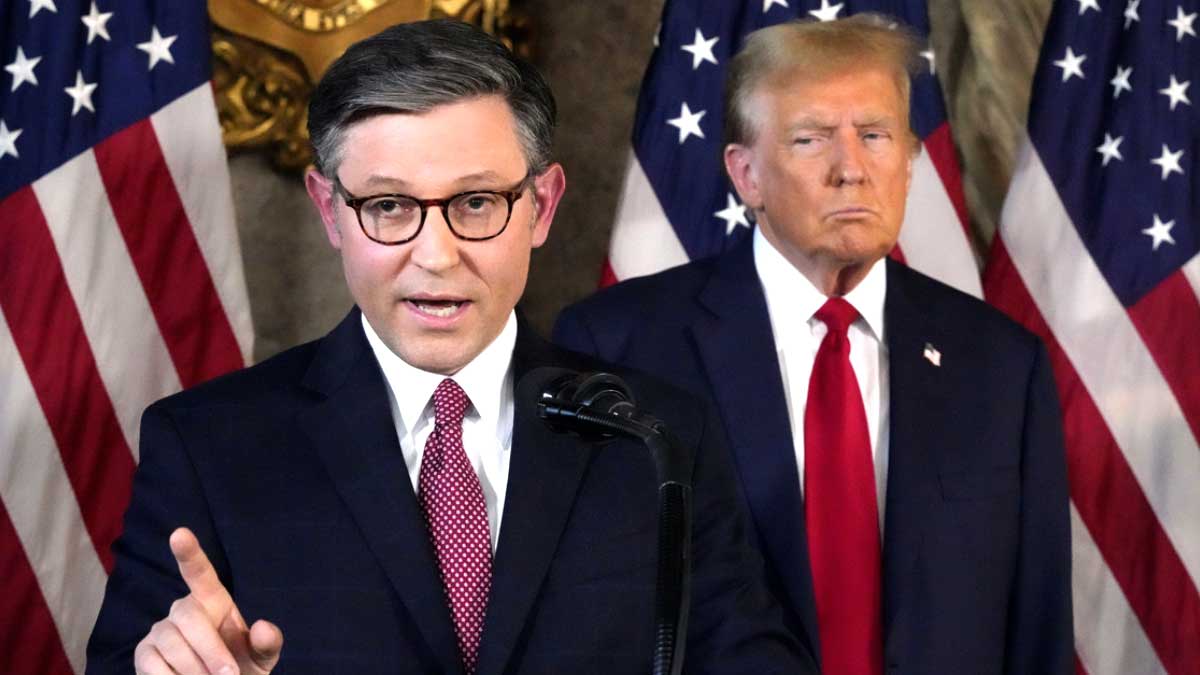- Home
- Billionaires
- Investing Newsletters
- 193CC 1000
- Article Layout 2
- Article Layout 3
- Article Layout 4
- Article Layout 5
- Article Layout 6
- Article Layout 7
- Article Layout 8
- Article Layout 9
- Article Layout 10
- Article Layout 11
- Article Layout 12
- Article Layout 13
- Article Layout 14
- Article Sidebar
- Post Format
- pages
- Archive Layouts
- Post Gallery
- Post Video Background
- Post Review
- Sponsored Post
- Leadership
- Business
- Money
- Small Business
- Innovation
- Shop
Recent Posts
House Rejects Trump-Backed Funding Bill, Shutdown Looms

The U.S. House of Representatives rejected a new government funding bill on Thursday, escalating fears of an imminent government shutdown. The bill, which was endorsed by President-elect Donald Trump, failed to pass with a vote of 235-174, with 38 Republicans joining Democrats to oppose the measure. The latest legislative stalemate marks yet another failed attempt to avert a potential shutdown, and Trump, signaling his indifference, framed the issue as President Biden’s responsibility to resolve.
The proposed funding bill sought to keep the government operational until March 14 while suspending the debt ceiling for two years, a contentious provision demanded by Trump. Despite his push for bipartisan support, the legislation faltered under criticism from both sides of the aisle. Earlier this week, Trump publicly opposed a prior funding bill championed by House Speaker Mike Johnson, R-La., criticizing it for excluding changes to the debt ceiling. The president-elect took to Truth Social to rally support for the latest proposal, calling it a “necessary compromise” and urging both Republicans and Democrats to vote in its favor. However, the bill was swiftly met with bipartisan resistance, particularly over the inclusion of the debt ceiling suspension.
Trump, along with billionaire ally Elon Musk, had lambasted the earlier funding bill. Trump criticized it for containing “sweetheart provisions for government censors” and accused it of prioritizing congressional pay raises over the struggles of ordinary Americans. Musk echoed these sentiments, denouncing the bill on X, formerly known as Twitter, as “one of the worst bills ever written.” On Friday, Trump suggested he would not oppose a government shutdown, provided it occurs before his presidency begins in January. Writing on Truth Social, he declared, “If there is going to be a shutdown of government, let it begin now, under the Biden Administration, not after January 20th, under ‘TRUMP.’ This is a Biden problem to solve, but if Republicans can help solve it, they will!”
Democrats were quick to unite against the proposed funding bill. House Minority Leader Hakeem Jeffries, D-N.Y., dismissed the legislation as unserious, calling it “laughable” in remarks to reporters. His comments provoked a sharp rebuke from Musk, who clarified he was not the bill’s author and accused Democrats of risking a shutdown for political leverage. Musk warned that rejecting the bill could have electoral consequences, stating that Democrats “deserve to lose bigtime in the midterms” if the shutdown proceeds. Tensions ran high in the House chamber during Thursday’s vote. Presiding Rep. Marc Molinaro, R-N.Y., tried to restore order before the proceedings but inadvertently broke the gavel while slamming it repeatedly. The incident elicited audible gasps and underscored the fraught atmosphere in the room.
If a new funding bill is not passed by midnight Friday, a partial government shutdown will begin. Such a scenario would disrupt a wide range of services, including the processing of Medicare applications and the furloughing of hundreds of thousands of federal employees. Travelers could also face delays due to reduced numbers of air traffic controllers and TSA agents. However, critical operations like power grid maintenance, border security, and in-hospital medical care are expected to continue, as has been the case during previous shutdowns. The debt ceiling has emerged as a major sticking point in the funding negotiations. Trump has repeatedly called for the suspension or elimination of the debt ceiling, arguing it is a relic that hampers effective governance. Earlier this week, he criticized fiscally conservative Republicans who opposed raising the debt ceiling, threatening to support primary challengers against them in upcoming elections. In a Truth Social post, Trump reiterated his stance, stating, “Congress must get rid of, or extend out to, perhaps, 2029, the ridiculous Debt Ceiling.”
While some Republicans share Trump’s frustration with the debt ceiling, others remain steadfast in their opposition to raising it, citing concerns over the national debt. According to The Wall Street Journal, these divisions within the GOP have further complicated efforts to pass a unified funding bill. As the clock ticks toward the shutdown deadline, lawmakers remain at an impasse, and the likelihood of a resolution appears slim. Trump, meanwhile, continues to emphasize the importance of addressing the debt ceiling in any funding deal, framing it as a critical issue for the next administration. “Remember, the pressure is on whoever is President,” he wrote, underscoring his belief that the current impasse is primarily Biden’s problem.
The ongoing funding battles have exposed deep fissures within both parties, raising questions about their ability to govern effectively. For Trump, the situation presents an opportunity to solidify his influence over the GOP and shape the party’s agenda ahead of his return to the White House. However, for millions of Americans, the threat of a government shutdown represents uncertainty and potential hardship, particularly during the holiday season. As the midnight deadline looms, all eyes are on Congress to see whether a compromise can be reached or if the nation will face yet another shutdown. The outcome will not only determine the immediate fate of government operations but also set the tone for the contentious political battles ahead.
Recent Posts
Categories
- 193 Countries Consortium Partner1
- 193cc Digital Assets2
- 5G1
- Aerospace & Defense48
- AI37
- Arts3
- Banking & Insurance11
- Big Data3
- Billionaires1,467
- Boats & Planes1
- Business332
- Careers13
- Cars & Bikes79
- CEO Network1
- CFO Network17
- CHRO Network1
- CIO Network1
- Cloud10
- CMO Network18
- Commercial Real Estate7
- Consultant1
- Consumer Tech194
- CxO1
- Cybersecurity73
- Dining1
- Diversity, Equity & Inclusion4
- Education7
- Energy8
- Enterprise Tech29
- Events11
- Fintech1
- Food & Drink2
- Franchises1
- Freelance1
- Future Of Work2
- Games149
- GIG1
- Healthcare79
- Hollywood & Entertainment203
- Houses1
- India’s 1000 Richest1
- Innovation46
- Investing2
- Investing Newsletters4
- Leadership65
- Lifestyle11
- Manufacturing1
- Markets20
- Media327
- Mobile phone1
- Money13
- Personal Finance2
- Policy569
- Real Estate1
- Research6
- Retail1
- Retirement1
- Small Business1
- SportsMoney42
- Style & Beauty1
- Success Income1
- Taxes2
- Travel10
- Uncategorized14
- Vices1
- Watches & Jewelry2
- world's billionaires1,436
- Worlds Richest Self-Made Women2
Related Articles
South Korea Plane Crash: A Tragic Loss and Global Mourning
The tragic plane crash at South Korea’s Muan International Airport on Sunday...
By 193cc Agency CouncilDecember 30, 2024H-1B Visa Debate Splits Trump Allies and Silicon Valley
The debate over H-1B visas has once again become a contentious issue,...
By 193cc Agency CouncilDecember 28, 2024Trump Moves $4B Stake in Truth Social Parent, Stock Drops 6%
Donald Trump recently transferred his 57% stake in Trump Media & Technology...
By 193cc Agency CouncilDecember 20, 2024Trump Named Time’s Person of the Year for Second Time
On Thursday, Time magazine honored Donald Trump as its “Person of the...
By 193cc Agency CouncilDecember 12, 2024















Leave a comment